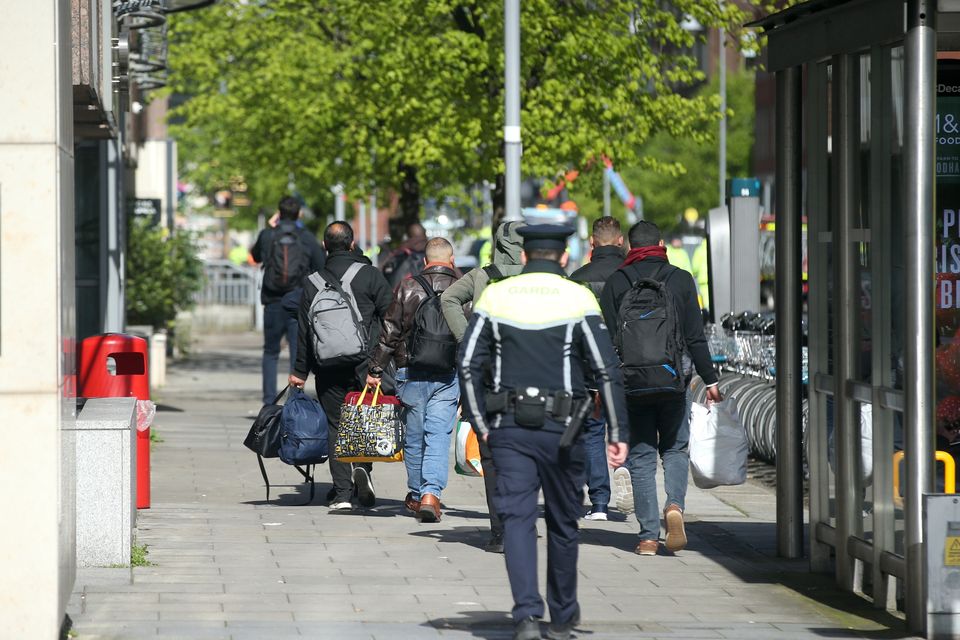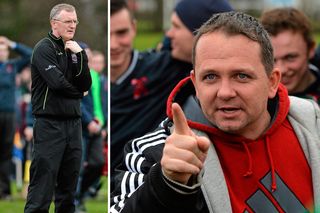Letters: It seems some of us have short memories when it comes to treating immigrants with compassion
Asylum-seekers are moved away from Mount Street in Dublin during a multi-agency operation. Photo: Collins
Since the Famine, the Irish people have spread far and wide, fleeing from hunger, war, destitution and persecution.
Many went to Australia or America. Others took the shorter journey across the Irish Sea in the hope of a better life.
They would stand at corners in long lines to take the sub from Murphy, Kennedy or John Laing.
A good pair of boots, strength and drive were all you needed to get yourself through the day. They would lay pipe or pull cable from London to Wolverhampton, build bridges and motorways from Devon to Luton. Put simply, the Irish always did what they could to survive.
They made their mark wherever they went: building skyscrapers, tackling new trends and forging new lands.
They married and prospered under unfamiliar skies, working hard and seeking opportunities of all kind. And what money they earned they sent back to their homeland.
But were the Irish always welcomed? That would be a no. It’s easy to forget we were hated and belittled too.
The Irish were also immigrants, just like those who are now diminished and despised by some in society. They had little or nothing – and sometimes an accent far too hard to interpret – but they just kept going despite the negative attitudes.
Not all who boarded the coffin ships flourished, and many perished on the journey.
Many more witnessed more hardship in faraway cities and lay awake dreaming of lost and familiar places.
Irish labourers worked hard and often and slept out under the starry night sky.
But it seems some of the Irish have forgotten where we came from.
How do we show respect to our past generations, the ones who sent money home and helped lay our very foundation?
We burn houses, shout abuse and target the forces of law and order to scare immigrants away.
But weren’t we too the same?
Julie Bennett, Co Laois
Our Government is just ‘scutting’ along instead of actually steering things
The cabinet sub-committee on migration met this week to discuss “ways to speed up the asylum application process”. Tánaiste Micheál Martin also told a meeting of the Fianna Fáil parliamentary party that communication on the immigration issue must improve on all fronts. These are headlines that ought to have appeared a year – maybe two or even three years ago.
It reminds me of the time when, growing up in Dublin in the 1960s, we had a phenomenon called “scutting”. If you drove a car along any of the roads in our area, you could expect to attract the attention of a band of boys and youths who would hang on to the rear bumper of your vehicle. That’s what seems to be happening with the serious issues of the day now, in particular immigration, housing and health.
The Government is scutting when those in charge should, at the very least, be steering the car.
Peter Declan O’Halloran, Belturbet, Co Cavan
If Jesus were in Ireland today, I wonder exactly how he would be treated
John Fitzgerald (Letters, May 2) asks whose side Jesus would be on with regard to asylum-seekers and immigration if he walked among us now.
If he existed, Jesus was from the Middle East and undoubtedly dark-skinned, so it’s really not too difficult to imagine how he would be treated today by some of the “Ireland for the Irish” brigade or, indeed, by the State.
If Jesus were here with us, I imagine he would be homeless and living in a tent somewhere on the streets of Dublin. As a young male asylum-seeker, he would most likely also be categorised by the far right as a “single man of military age” and there would be queries about whether he had been properly “vetted”. Some would suggest he constitutes a danger to local women.
In short, he is immensely lucky not to be among us now.
Fintan Lane, Lucan, Co Dublin
For asylum-seekers, it seems the State’s motto is ‘out of sight, out of mind’
Watching the numerous agencies of the State (efficiently mobilised by the Government) shifting asylum-seekers away from Mount Street in Dublin brought Einstein’s observation into sharp focus: “Problems cannot be solved by the same thinking that created them.”
It is obvious that members of the Government continue to see the homeless as the problem, and the solution is to keep them hidden from sight – at any cost.
Jim O’Sullivan, Rathedmond, Co Sligo
Our inadequate health service can’t be allowed to let people suffer and die
No matter the number of inspections of hospitals by Hiqa or HSE teams, the problems facing staff and patients alike is capacity.
The deaths of patients on trolleys should be a watershed moment, but, sadly, they could happen again unless we reverse disastrous decisions taken by the Department of Health and the HSE to reduce the number of emergency departments and downgrade essential hospitals.
You would think in this present day that our health service would be fit for purpose, but it’s not.
“Systemic failures” and “lack of communication” in overcrowded emergency departments led to the undignified and horrible death of 16-year-old Aoife Johnston from Shannon, Co Clare.
Time and again, the same scenarios play out all over this country. Patients are left unattended and untreated for hours on end, with staff overworked and exhausted.
Families of those who have died have been failed, and they have been failed miserably. Inadequate planning, oversight and governance must be addressed with the urgency they demand.
Christy Galligan, Letterkenny, Co Donegal
Forget about the idea of a single God, it has always been about the Trinity
Declan Foley (Letters, May 2) writes about people “fooling themselves about the Trinity”. I presume the misunderstood philosopher he speaks about is Jesus Christ, who is no mere philosopher, but the Son of God in the flesh who has revealed that God is a Trinity of persons living together in love and harmony.
The Trinity is not an abstract doctrine, but a way of living together. If God means three divine persons in eternal communion among themselves, then we must conclude that we also are called to communion.
Our survival is intrinsically related to our belief and union with God as Father, Son and Holy Spirit. Don’t be fooled, a single solitary God does not fit the bill. The reality of God has always been the reality of a Trinitarian God.
Séamus Humphreys, Dungarvan, Co Waterford
Ireland has moved on, but this country is still a very judgmental place to be in
While I agree with Frank Coughlan (‘Old Ireland is gone, but you can catch a glimpse of it in our traditions’ – Irish Independent, April 30) that Ireland has moved on from economic stagnation in a few short generations, I don’t agree with him on the point about moral rigidity.
Ireland is still a very judgmental place to live. You’re damned if you do or damned if you don’t in this country. That’s a general comment. You are damned if you have a baby in modern Ireland and damned if you don’t. You are damned if you buy a house or if you are forced to stay with parents. If you go to college you rack up debt and if you don’t you will be poorly paid.
We need to listen and understand each other more. Leave the judging up to the judges.
Liam Doran, Clondalkin, Dublin 22
Rubens stands out among his peers, and exhibition at National Gallery is a joy
An Irish portrait painter once passed on advice she heard in St Petersburg.
Her bearded tutor paused at her easel and solemnly regarded her canvas. Before shuffling on, he mumbled: “Study Rubens.”
This injunction impressed her, but it struck me as glib. Peter Paul Rubens is one of those great masters, like Raphael, more honoured in theory than practice. His religious allegories no longer astound or move.
I got wise last week on a visit to the National Gallery’s exhibition of Dutch and Flemish portraits. The format lets one compare intimate character studies by the greatest artists of the Golden Age. Even next to Rembrandt, Van Dyck and Vermeer, Rubens’ genius shines. Turning Heads ends on May 26.
Aidan Harte, Naas, Co Kildare
Join the Irish Independent WhatsApp channel
Stay up to date with all the latest news















